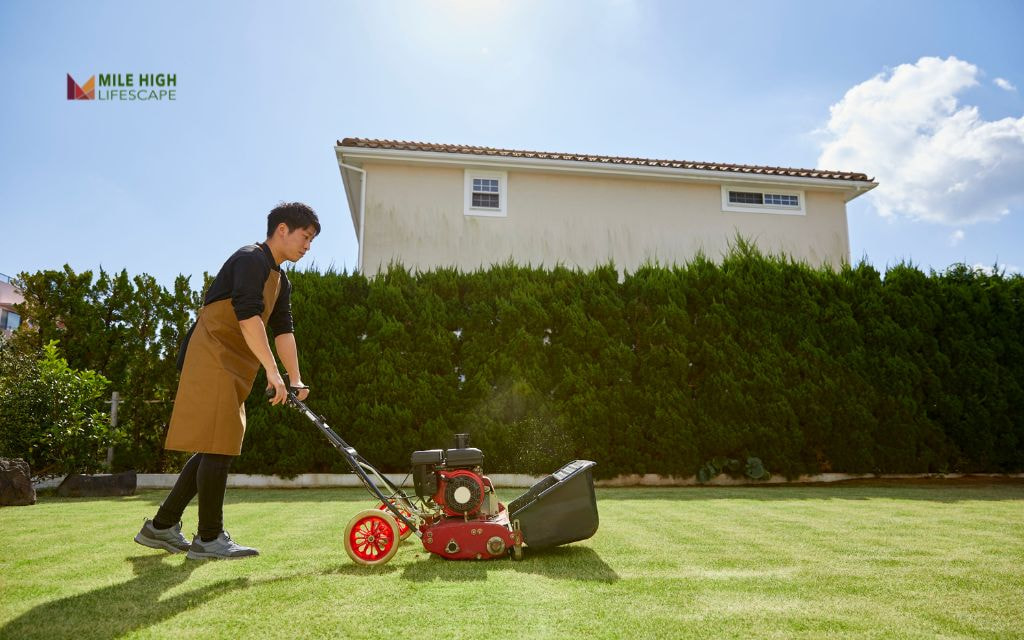Deciding between mowing your own lawn or hiring a professional really comes down to what matters most to you. If you value time and convenience, bringing in a pro might be the way to go, as they provide reliable service and can spare you from the hard work. On the other hand, if your main focus is saving money and you like getting your hands dirty, mowing your own lawn can be a budget-friendly option, though it does take time and some investment in tools.
Let’s compare the key factors that impact the mow lawn yourself vs hire debate in this blog below.
Quick Comparison: DIY vs. Pro Lawn Mowing
| Factor | DIY Mowing | Hiring a Pro |
| Cost per Month | $25-$75 (fuel, time, equipment upkeep) | $150-$250 (weekly service) |
| Time Commitment | 1-2 hours/week | 0 hours – pros handle everything |
| Quality Control | Depends on skill and equipment | Commercial equipment + professional technique |
| Flexibility | Complete schedule control | Reliable, weather-adjusted scheduling |
| Equipment Required | Yes – mower, gas, maintenance tools | No equipment needed |
| Outcome | Varies with experience and effort | Consistent, professional appearance |
DIY mowing offers control, but professional services save time. The decision depends on your priorities. For those investing in lawn health, understanding proper mowing after overseeding is crucial. Mile High Lifescape offers expertise, freeing up your weekends. Consider your schedule, lawn goals, and lifestyle.
Cost Breakdown: What Are You Really Paying For?
The financial comparison between DIY and professional lawn mowing extends beyond the obvious numbers. Understanding the complete cost picture requires examining both direct expenses and hidden costs.
DIY Mowing Costs (Annual)
- Lawn mower: $300-$600 upfront investment
- Fuel and oil: $50-$75 per season
- Blade sharpening: $10-$15 each time
- Trimmer and edger: $100-$200 upfront
- Time value: 50-70 hours per year (valued at $20-$40/hour)
Professional Mowing Costs
- Weekly service in Denver: $30-$60 per visit
- Monthly commitment: $160-$250 average
- Optional add-ons: fertilization, aeration, weed control
- Value-added benefits: expertise, consistency, liability protection
The lawn care services Denver cost initially appears higher for professional options. However, DIY expenses often climb when factoring in equipment depreciation, maintenance costs, and the value of your time. For many homeowners, particularly those with larger properties, the cost difference narrows significantly.

The true financial question becomes: “Is it worth paying for lawn mowing in Colorado?” For busy professionals, the answer frequently lies in the opportunity cost of weekend hours spent pushing a mower rather than enjoying Colorado’s outdoor lifestyle.
Time Investment: Weekend Chore or Weekly Escape?
Time represents the most significant factor for many homeowners in the DIY versus professional debate. Let’s break down the weekly time commitment for typical lawn maintenance:
| Task | DIY Time (per mow) | Pro Crew |
| Mowing | 45-90 minutes | 15-25 minutes |
| Trimming/Edging | 15-30 minutes | Included |
| Cleanup | 10-15 minutes | Included |
| Total per Week | 1.5-2 hours | 0 homeowner hours |
Denver homeowners face additional time challenges. Hilly lots in neighborhoods like Highlands or Golden require more effort. Larger suburban yards in areas like Littleton or Westminster can double these time estimates.
Consider the opportunity cost: what would you do with an extra 4-6 hours each month? Hiking a 14er, attending a Rockies game, or simply relaxing without the pressure of yard work awaiting you represents the real lifestyle impact of lawn maintenance decisions.
One Mile High Lifescape client shared: “After tracking my DIY lawn care time for a month, I realized I was spending over 8 hours that could have been family time. The professional service became an investment in our quality of life.”

Equipment Ownership: Freedom or Frustration?
Owning lawn equipment provides independence but demands responsibility. The DIY approach requires:
- Purchasing a quality mower ($300-$1,200)
- Maintaining fuel supply or battery charging systems
- Regular blade sharpening for optimal cuts
- Garage or shed storage space
- Technical knowledge for maintenance and repairs
Professional services eliminate these concerns entirely. Mile High Lifescape uses commercial-grade equipment maintained daily by trained technicians. This ensures optimal performance without any homeowner investment in tools or maintenance knowledge.
Consider Denver’s specific challenges: high altitude and dry conditions accelerate blade wear, while variable terrain demands versatile equipment. Professional lawn care companies maintain specialized tools designed for Colorado’s unique conditions.
The home lawn maintenance equipment decision comes down to a simple question: do you enjoy equipment maintenance, or would you prefer to eliminate this responsibility entirely?
Lawn Quality: Can DIY Match Pro Results?
Yes – DIY efforts can produce excellent lawns, but professional results typically come with less trial and error. The quality gap stems from several factors:
Professional Advantages:
- Crews follow consistent mowing patterns
- Equipment receives daily maintenance
- Blade heights adjust seasonally for optimal grass health
- Trained technicians recognize early signs of lawn problems
- Proper technique prevents scalping and lawn damage
Mile High Lifescape technicians understand Denver’s specific lawn challenges: Kentucky bluegrass dominance, high-altitude sun intensity, and clay soil considerations. This knowledge translates to lawns that maintain health through Colorado’s extreme seasonal changes.
Professional mowing benefits extend beyond appearance. Proper cutting technique promotes deeper root growth and natural disease resistance. The consistency of professional care establishes patterns that enhance overall turf density and weed suppression.
Professional mowing benefits extend beyond appearance. Proper cutting technique promotes deeper root growth and natural disease resistance. The consistency of professional care establishes patterns that enhance overall turf density and weed suppression. For insights on nurturing new lawns, explore our guide on when to cut new grass, ensuring healthy growth from the start.
Lifestyle Fit: What Type of Homeowner Are You?
Your personal preferences and lifestyle should guide your lawn maintenance decision. Consider which profile better describes you:
DIY may work best if you:
- Enjoy outdoor yard work as a hobby
- Have a manageable lawn under 5,000 square feet
- Maintain a consistent weekend schedule
- Take pride in hands-on home maintenance
- Have equipment storage space available
Professional service makes sense if you:
- Travel frequently or work variable hours
- Own multiple properties or a larger yard
- Value weekend freedom for recreation
- Want consistency without planning or effort
- Dislike equipment maintenance tasks
The pros and cons of mowing your own yard extend beyond practical considerations to include lifestyle preferences. Your satisfaction with either choice depends largely on how it fits your priorities and schedule.

Denver-Specific Considerations That Affect Your Choice
Denver’s unique environment creates special lawn care challenges that impact the DIY versus professional decision:
High Elevation Effects:
- Faster blade drying requires proper cutting height
- Intense UV exposure increases lawn stress
- Rapid weather changes disrupt mowing schedules
Seasonal Challenges:
- Short growing season demands optimal care
- Dry summers require precise mowing timing
- Clay-heavy soil creates compaction issues
Local Property Characteristics:
- Typical suburban yards (5,000-10,000 sq ft) require significant time
- Variable terrain increases mowing difficulty
- Water restrictions impact mowing practices
Professional crews adjust schedules around weather patterns, postponing service after thunderstorms when soil conditions would damage lawns. This flexibility helps Denver homeowners maintain healthy turf despite unpredictable climate conditions.
Local lawn mowing services understand Colorado’s microclimate variations between neighborhoods like sunny Stapleton versus shadier Washington Park properties. This expertise translates to customized approaches impossible with one-size-fits-all DIY methods.
How to Decide if You Should Mow Your Own Lawn
Making the final decision requires honest assessment of several factors:
- Time Availability: Calculate your actual available hours for consistent maintenance
- Budget Reality: Compare complete costs including equipment and time value
- Property Assessment: Evaluate your lawn size, terrain, and complexity
- Personal Preference: Consider whether you enjoy or dread lawn work
- Quality Expectations: Determine your standards for lawn appearance
If you’re still uncertain, consider a hybrid approach. Many Mile High Lifescape clients begin with professional service during their busiest seasons, then reassess based on their experience.
DIY mowing offers control, but professional services save time. The decision depends on your priorities. For those investing in lawn health, understanding proper mowing after overseeding is crucial. Mile High Lifescape offers expertise, freeing up your weekends. Consider your schedule, lawn goals, and lifestyle.
Conclusion
Whether you enjoy the ritual of mowing or see it as a necessary chore, the right decision balances practical considerations with personal preference. DIY mowing offers hands-on control and potential cost savings. Professional service from Mile High Lifescape delivers time savings, consistent results, and peace of mind.
The lawn care services reliability and convenience of hiring professionals continues to attract Denver homeowners looking to maximize their Colorado lifestyle. Many find the time vs money lawn care debate resolves itself after experiencing the freedom of professional service.
Want to see how much time and effort you could save? Get a free quote from Mile High Lifescape and let our experts handle your lawn maintenance while you focus on enjoying life in Colorado.
Frequently Asked Questions (FAQs)
Is it cheaper to mow your own lawn?
Initially yes, but equipment costs, maintenance, and time value often make professional service comparable for medium to large properties over time.
How much does it cost to hire lawn care in Denver?
Typical professional mowing services range from $30-$60 per visit for standard yards, with monthly costs averaging $160-$250 for weekly service.
Can I get one-time mowing instead of a subscription?
Yes, Mile High Lifescape offers flexible on-demand options for homeowners who need occasional service rather than regular maintenance.
Will a professional service do a better job than I would?
Typically yes – professionals bring commercial equipment, consistent techniques, and specialized knowledge that develops through daily practice across hundreds of properties.
What’s the best time of day to mow in Denver?
Early morning or evening provides optimal conditions, avoiding midday heat that stresses grass and potentially damages turf.

